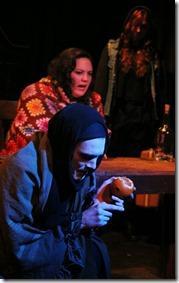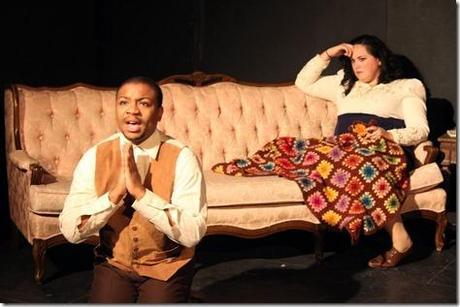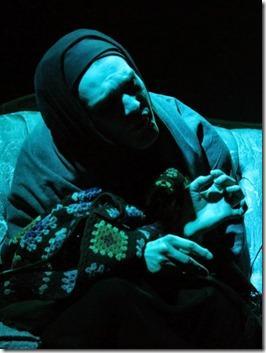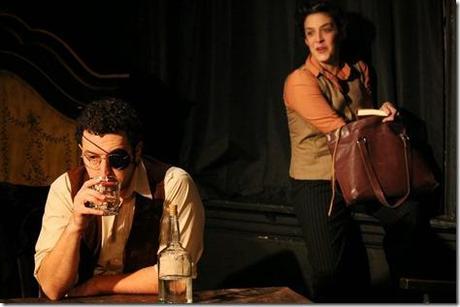
A Bright Room Called Day
Written by Tony Kushner
Directed by Laura Elleseg
Chemically Imbalanced Theater, 1422 W. Irving (map)
thru Nov 23 | tickets: $10-$20 | more info
Check for half-price tickets
Read review
Young troupe revives difficult classic to great results

Spartan Theatre Company presents
A Bright Room Called Day
Review by Clint May
In 1990, Michael Godwin coined what would become known as Godwin’s Law, which states that a long enough internet-based discussion will inevitably bring up comparisons to Hitler no matter what the subject matter. It’s an extension of the much earlier Reductio ad Hitlerum coined by Leo Strauss, a philosopher who saw the rise of Nazi comparisons being used to thwart otherwise salient arguments by appealing to the worst evil known. There’s a danger inherent in such knee-jerk comparisons. Creating a “boy who cried wolf” blasé attitude towards anyone trying to make the comparison blinds us towards true terrors.

Through a mouthpiece of a young woman in 1982’s Berlin (Jaci Kleinfeld), Kushner’s dissection is borderline histrionic. Her digressions into conspiracy theories and Revelations-based auspices (Ronald Wilson Reagan=6 letters each=666) seems to make light of her more valid arguments. It becomes difficult to tell what Kushner is really trying to say in the midst of this sometimes incisive, sometimes oversimplified, frequently entertaining script.
The real meat and potatoes is set in the past. In early 1930’s Berlin, the apartment of aspiring actress Agnes Eggling (Amanda de la Guardia) is a sanctuary of drinks, opium and intellectual discussion. Life is relatively okay in the Weimar Republic. There’s a vague but increasing concern on the horizon as this newfangled Nazi party continues to gain support from disenfranchised Germans from multiple political affiliations. The group is a microcosm of the fractured liberals unable to create a united front to combat the rise of Hitler even as the Nazis begin undoing their fragile constitution (Gleichschaltung). Even when Agnes’ lover (Guy F. Wicke) summons the literal devil (Andy Monson) in a grand Kushnerian flourish, his foreshadowing of terrible things to come cannot quite overcome their paralysis until they must flee one by one or face dire consequences. At the center of the maelstrom, Agnes is pushed and pulled as her loyalty to her friends is questioned and her political affiliations tested.
Kushner moves the action along swiftly, and video projections thankfully allow us to stay ‘current’ with outside political forces and the date. Director Laura Elleseg keeps the pace strong and steady, giving ample breathing room for the many poetic interludes and soliloquies sprinkled throughout. Most everyone in the cast is fine-tuned to the material. La Guardia is particularly on point—the embodiment of the damning inaction that allows evil to flourish while we were busy trying to think things would get better without any needed intervention. It’s easy to hate her in hindsight, but we sympathize with her too because we know we too might have been unable to see the whole from the parts. Only Monson seems out of step with the others—a cartoonish caricature lacking foreboding gravitas when playing the devil or the ghost of war yet to come. Otherwise the youthfulness of the cast (in relation to the usual middle-aged called for by the script) becomes unnoticeable quickly, which is not an easy feat.
A Bright Room is timely viewing for liberals after the recent mid-term elections. Kushner’s morality fable on the dangers of complacency is a clarion call to rally against its dangers. Whether it be born of intellectual paralysis (a Nirvana Fallacy), pure cynicism (disguised laziness), or a kowtowing fear, we must overcome inertia to act in deference to our conscience.
Rating: ★★★½
A Bright Room Called Day continues through November 23rd at Chemically Imbalanced Theater, 1422 W. Irving Park (map), with performances Fridays and Saturdays at 7:30pm, Sundays 3pm. Tickets are $10-$20, and are available online through BrownPaperTickets.com (check for half-price tickets at Goldstar.com). More information at SpartanTheatre.org. (Running time: 2 hours 25 minutes, includes an intermission)

artists
cast
Amanda de la Guardia (Agnes), Alex Gonzalez (Paulinka), Naomi Mark (Gotchling), David Guiden (Baz), Jaci Kleinfeld (Zillah), Andy Monson (Die Alte, Herr Swetts), James Romney (Traum), Emma Sharp (Rosa Malek), Guy F. Wicke (Husz)
behind the scenes
Laura Elleseg (director), Robert Alan (assistant director), Patrick Belics (producer), Amber Dettmers (stage manager), Kenton Gott (lighting design, board operator), Tim Bickel (sound design, board operator), Sierra Nibbe (costume design)
14-1104

